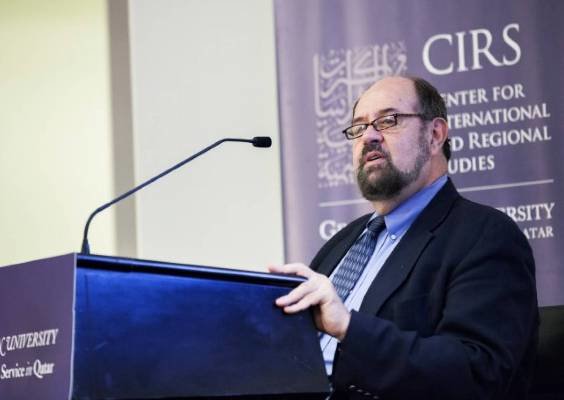Iran's ballistic missile development completely legal: Minnesota professor

TEHRAN - Prof. William O. Beeman, head of the anthropology department at the State University of Minnesota, is of the view that Iran's ballistic missile development is completely legal.
Beeman also tells the Tehran Times that “As long as other nations don't reimpose sanctions, including the United Nations and the European Union, Iran will just let the United States do what it wants in complete isolation.”
Following is the text of the interview:
Q: Despite many internal and external oppositions, Trump decertified the JCPOA. What were the reasons behind his decision? What signal did he want to deliver both internally and externally by doing so?
A: The "decertification" was the result of a Congressional Bill that was passed in 2015, H.R.1191 - Iran Nuclear Agreement Review Act of 2015. The Republicans in Congress refused to "approve" of the JCPOA unless this act was approved and signed by President Obama. This act has nothing to do with the actual provisions of the JCPOA (which is a United Nations Resolution). Nor does it have anything to do with Iran's compliance with the terms of the JCPOA. What the act requires the President to do is to "certify" every 90 days that the JCPOA is in "the interests of the United States." President Trump before he was elected promised to "tear up" the JCPOA. He couldn't do that, and in fact he was forced to declare in September that Iran was in compliance with the JCPOA. So under this Congressional Act he declared that the JCPOA was not (or no longer) in the interests of the United States. This throws the question of whether to re-impose sanctions on Iran back to Congress. They have 60 days to decide. This allows Trump to say that he rejected the JCPOA without actually cancelling U.S. involvement in the agreement. If Congress decides to reimpose sanctions, it is unclear whether the United States will be in violation of the JCPOA. Trump would love it if Iran decided to withdraw, because then he could blame Iran for pulling out. But the short answer is that Trump did this solely for his own political purposes, and not because Iran actually violated the act.
Q: A re-imposition of sanctions on Iran by Congress will in fact be tantamount to the violation of JCPOA. In that case, Trump makes Congress responsible for the scrap of the very deal. What do you think?
A: ?The important word is "tantamount." I don't know what Congress will do. The Senate has voted overwhelmingly for sanctions on Iran in the past. H.R. 1191 passed 99-1 and the additional sanctions on the IRGC earlier this year passed 98-2. This means almost all Democrats voted for this. Congress is in a quandary about this. ?Some who voted for additional sanctions on Iran believe that reimposing sanctions will put the United States in breach of the JCPOA. Others say no. Still others think that this situation will make it possible for the United States to bargain with Iran about matters that have nothing to do with the JCPOA, like Iran's (completely legal) ballistic missile development, support for Hezbollah and President Assad of Syria and even questions about releasing Iranian-Americans in prison in Iran and other human rights questions. So this is very much up in the air, but Trump has now washed his hands of further responsibility.
Q: In Europe, a single voice concerning the violation of JCPOA cannot be heard. French President Macron had underlined before that it would be necessary to include some articles pertinent to human rights and missile issues within JCPOA. This is somehow similar to Trump' word. Do you think Europe will follow suit?
A: Only President Macron is saying this. The other P5+1 nations don't agree. Moreover, the JCPOA is actually a United Nations Security Council Resolution. At this point France and the United States have no power to renegotiate the JCPOA. However Congressional leaders and perhaps President Macron think that the possibility of reimposing sanctions will compel Iran to enter into negotiations on these non-nuclear issues. ?
Q: Iranian Foreign Minister Mohammad Javad Zarif has underscored so far that the JCPOA is deemed a deal when all parties are committed to it. What will be Iran's reaction to possible U.S. withdrawal from the deal?
A: ?Well, I don't know for sure. You probably know more about the Iranian reaction than I do, but my guess is that as long as other nations don't reimpose sanctions, including the United Nations and the European Union, Iran will just let the United States do what it wants in complete isolation. Technically the United States can claim that it has not broken the agreement, but you know that if sanctions are reimposed this is simply a political sophistry One thing that will be affected is the sale of Boeing jets to Iran. If Iran wanted to protest, they could immediately note that re-imposition of sanctions would kill this deal, and it would not be Iran killing the deal, but rather the U.S. Congress itself. Iran could also note that combined trade between Iran and the United States is now at about $120million (imports and exports), and this would stop if sanctions are imposed. A third thing to tell Prime Minister Macron is that Iran is already using French banking sources that have no operations in the United States to process its trade deals, and if France doesn't uphold its part of the agreement, those financial resources will disappear.
Leave a Comment